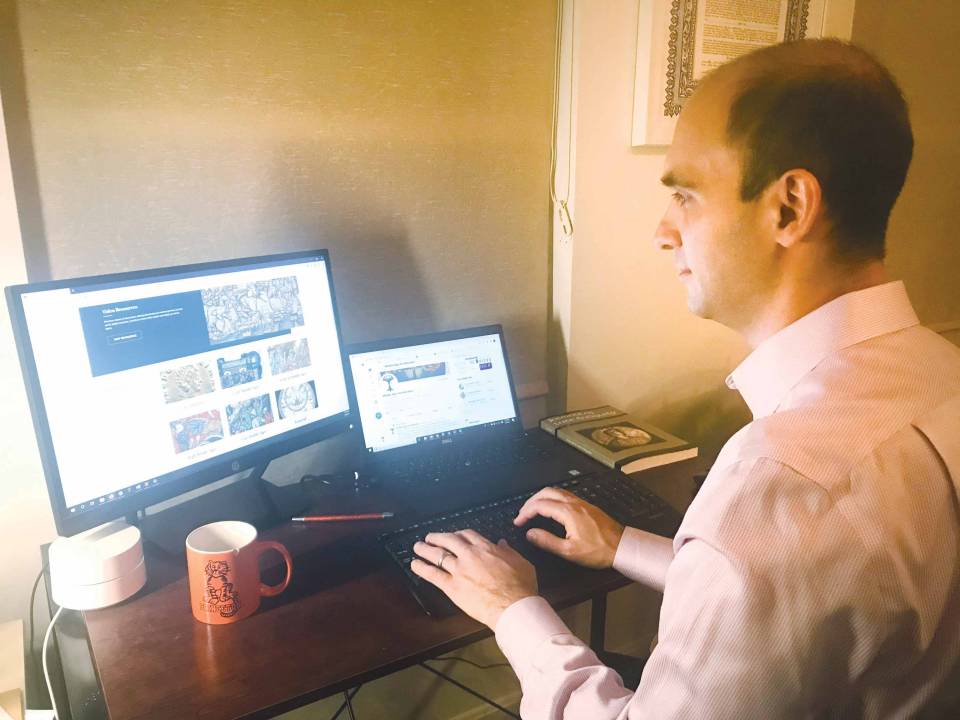Princeton’s Program in Medieval Studies and the Committee for the Study of Late Antiquity have launched a new website, Middle Ages for Educators
The COVID-19 pandemic has brought about rapid innovations in distance learning and the wide adoption of digital tools. For many educators, however, having the capability to teach virtually is not the same as having digital-ready content.
“When the pandemic began, there was the realization that everyone was going to be on Zoom, but you shouldn’t teach online the same way you teach in person,” said Merle Eisenberg, a recent postgraduate research associate in history, who graduated from Princeton with a Ph.D. in 2018 and is now a postdoctoral fellow at the National Socio-Environmental Synthesis Center at the University of Maryland.
To make these lessons come alive for students, Eisenberg, together with medieval scholars Sara McDougall, an associate professor of history at John Jay College of Criminal Justice and the City University of New York Graduate Center, and Laura Morreale, chair of the digital humanities and multimedia committee of the Medieval Academy of America, decided to develop materials that high school and college educators could use in a virtual setting.
The resources they created became so popular so quickly that they needed a permanent home for them and greater technical support to meet the demand. The result is a new website, Middle Ages for Educators (MAFE), featuring short video lectures by world-renowned experts, translated primary sources, workshops on how to use digital tools to study the medieval past, and curated links to websites with medieval content.
Designed by Princeton’s Web Development Services, MAFE is a collaboration between the researchers and Princeton’s Program in Medieval Studies and Committee for the Study of Late Antiquity, with support from Princeton’s Humanities Council.
“It’s a very useful tool for new ways of teaching and new ways of thinking about teaching moving forward,” Eisenberg said.
Users can search the site’s medieval history resources — spanning global history from approximately A.D. 300-1500 — by geographic region, era or topic.
The materials have been accessed more than 25,000 times since the project launched in March 2020, and they have been deployed by educators from colleges including Arkansas State University, Fordham University, Johns Hopkins University, U.S. Naval Academy, the University of Guelph, the University of Maryland-Baltimore County, and the University of Rochester.
The Medieval Academy of America and American Historical Association have used MAFE’s resources to enhance their educational outreach, Eisenberg said. MAFE also is in discussion with Princeton’s Program in Teacher Preparation to develop materials for local secondary schools.
“There’s a huge appetite out there for teaching material at the secondary school and the college level,” said Jack Tannous, associate professor of history and Hellenic studies, and chair of the Committee for the Study of Late Antiquity. “As a teacher myself, I’m always scrambling for pictures and this sort of thing.”
Public-facing initiatives are not new for Princeton scholars, but they are taking on a greater significance at a time when educators at all levels require new teaching tools and — especially those working in the humanities — are finding their resources are more limited due to tightening budgets.
Rhae Lynn Barnes, assistant professor of history, is co-founder and CEO of U.S. History Scene, which provides free digital resources and lesson plans to public educators. In response to COVID-19 in 2020, she launched “The Show Must Go On: American Culture in Times of Crisis,” a free curriculum of lesson plans and filmed mini-lectures by leading scholars.
Princeton’s Global History Lab, taught by Jeremy Adelman, the Henry Charles Lea Professor of History, is now open to learners worldwide — including refugee and migrant learners — who are interested in exploring world history from 1300 to the present.
“It’s great for the public, and it’s great for the profession,” Tannous said. “It’s also good for the University. We aren’t just talking with each other. We’re interested in reaching other people and sharing with other people.”
Helmut Reimitz, professor of history and director of the Program in Medieval Studies, said MAFE showcases Princeton’s strength in Late Antiquity and medieval scholarship, spanning many languages and departments, and it serves as a credible source for those seeking reliable teaching materials.
“It’s easier for all of us to go out and present something if it has the Princeton label,” he said. “My colleagues in Europe and elsewhere are very grateful to have this interaction with Princeton.”
Reimitz said what MAFE offers is different from what a library might provide through an online archive since it gives context to the materials and focuses on pedagogy. Among the resources the scholars hope to add in the coming months are maps for specific topics and lessons, new videos featuring Princeton professors, and a podcast.
Reimitz credits Princeton’s Web Development Services with making the site welcoming and user-friendly for all seeking to learn more about medieval history. “The cooperation with the Web Development Services at Princeton was just fantastic,” he said. “These guys are amazing. They started to love medieval studies. Their creativity, their professionalism, their kind way to deal with this sometimes-a-little-weird subject was really outstanding.”

